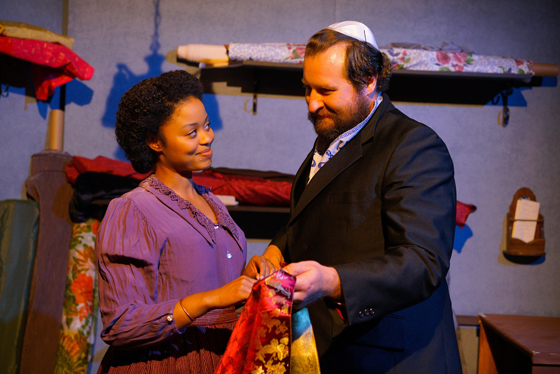

CARLSBAD, California — “The Bravest Little Theater That Could” is the name I want to assign to New Village Arts. Each season this little theater tackles new and challenging shows and always pulls them off with aplomb. Lynn Nottage’s Intimate Apparel completely lives up to this with an immensely talented cast. Brilliant staging delivers a tale that is at once poignant, historically accurate, and tender.
Esther (Tamara McMillian), an African American seamstress, resides in a boarding house in Manhattan. The characters came from the author’s shoebox of sepia photographs. Photos of seamstresses, bellman, janitors, blacksmiths and others in the service industry all were held captive in this box until Lynn Nottage gave them breath as characters, venerating her great-grandmother, who sewed intimate apparel for women at the turn of the century. This woman, talented with a needle, lacked the ability to read. When a young man working on the Panama Canal courts her through correspondence, she, at 35, feels motivated to explore this relationship that has been sanctioned by her minister. George Armstrong (Taurian McLeod) describes the hardships of building the canal but writes poetically about his fondness for this woman he has not yet met. When he offers marriage, Esther accepts.
Esther is warned against marrying this stranger by the woman who runs her boarding house, Mrs. Dickson (Milena Sellers Phillips). Yet she is aided by a client, the beautiful, unhappy Mrs. Van Buren (Gerilyn Brault) to respond to Mr. Armstrong’s letters. When she accepts his proposal she does so with most of her heart.
A piece of her heart is not at liberty to commit, as Esther has an interesting attachment to Mr. Marks (Tom Steward) who sells her fabric. Mr. Marks is an Orthodox Jew. The two share many similar fondnesses, but they can never fully express them because as an Orthodox Jewish man he has many limitations and living in 1905, the two can not bridge their cultural gap. Their connection is obvious, yet the relationship remains chaste because it must. He is to be committed to a Romanian fiancee he has never met, and he could never marry an African American, non-Jewish woman.
In short order, George Armstrong arrives and the two are married. The marriage does not fulfill either of their expectations and in the end, George, we learn, is not the man he made himself out to be. He also is unable to read, and only seeks to get whatever he can from Esther. In the interim, he also enjoys the company of a prostitute, the sassy Mayme, brilliantly and playfully portrayed by Cashae Monya.
I am grateful to Nottage for unearthing the photos and sharing this personal snippet of her own family history. She most certainly earned her 2004 Drama Critics Circle Award for Best Play, as well as the MacArthur Genius Grant in 2007, among many other accolades and prizes.
Intimate Apparel runs through October 20th. Tickets may be purchased via www.newvillagearts.org
*
Eva Trieger is a freelance writer specializing in coverage of the arts. She may be contacted via eva.trieger@sdjewishworld.com
Pingback: 'Never Again is Now' references Poway shooting - San Diego Jewish World